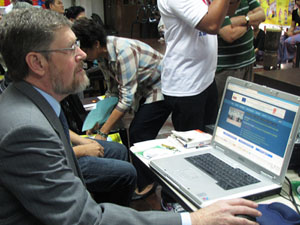CenPEG kicks off 60-day Countdown to E-day
In line with its advocacy for transparent and credible elections, the Center for People Empowerment in Governance (CenPEG) launched an intensive information campaign on March 10 or 60 days before the May 10 synchronized automated elections.
The campaign carries the theme “Automation man, possible ang dayaan. Pag-aralan, ipaalam, makialam!” (Automation will not end fraud: Inform, educate, advocate!)
Banderitas (miniature flags) festooned the Balay Internasyunal (formerly Balay Kalinaw) in the University of the Philippines, Diliman which served as venue for the launch. Inside, indigenous gongs continually beat and members of the cultural group, Tag-ani Performing Arts Society, chanted “Boto mo ay bantayan!” as CenPEG partners signed their support for the campaign.
Despite the festive mood, the call to protect the integrity of the ballot and ensure transparency in all election proceedings resonated. Dramatizing this message was the start of 60-day Countdown to E-Day.
In his opening remarks, Temario Rivera, CenPEG Board vice-chair and Senior Fellow, gave a backdrop to the project such as the strategic role of CenPEG in research engagement on the automated elections.
Highlighting the event was the launching of Project 30-30, CenPEG’s research, education and election monitoring project. The project aims to continue CenPEG’s in-depth study of the automated election, monitoring and poll watching, the holding of voters’ education, and an international observers’ mission.
European Union

www.eu-cenpeg .org goes online : EU Ambassador Alistair McDonald navigates the latest comprehensive and in-depth website on the automated elections system in the Philippines (CenPEG photo)
The two-year project is funded by the European Union (EU) through the European Commission Delegation to the Philippines.
To implement the comprehensive and multi-stage project, CenPEG has partnered with the Coordinating Council for People’s Development and Governance (CCPDG), National Council of Churches in the Philippines (NCCP), Computer Professionals’ Union (CPU), National Union of People’s Lawyers (NUPL), and Health Alliance for Democracy (Head).
The project’s key components include policy research and documentation; voters’ education and training; advocacy, lobbying, and campaigns; poll watching and monitoring; networking and conduct of multi-stakeholders’ dialogues; publications and multi-media materials; and the conduct of conferences and round-table discussions.
Information, education and campaign (IEC) materials were also launched to pursue Project 30-30’s objective of “increasing the level of understanding and capacity of the civil society community, especially people’s organizations and NGOs on the complexities, vulnerabilities, and critical areas of the AES.”
The IEC materials included the jingle, 30-seconder audio-video production and the website.
Other IEC materials, such as primers in printed and CD formats, posters, and button pins were distributed to the audience.
The materials will be distributed nationwide to cover and reach as many people and communities at the grassroots level in the broad efforts to safeguard their votes and counter election fraud.
Ambassador Alistair McDonald, head of delegation of the European Union in the Philippines, graced the event. Together with National Artist and CenPEG board member Bienvenido Lumbera, both took the first shot at navigating the website (http://eu-cenpeg.org), projected on screen for the audience to see.
AES Watch convenor and UP Alumni Association President Alfredo E. Pascual also expressed his support to Project 30-30.
CenPEG Executive Director Evi-ta Jimenez led the signing of citizens’ commitment to vigilance in poll monitoring and guarding the vote.
Anthropologist Prof. Rosa Castillo hosted the program. Other performers included E-Dance, composer-singer-poet Jesus Santiago and Cebu-based performer Rommel Tuico.
- Probing presidential platforms
- Conference calls for people-centered policy actions for Asian development and peace
- WWII 'comfort women' urge visiting Japanese emperor: OFFICIAL GOV’T APOLOGY, UPHOLD TRUTH, and JUST COMPENSATION
- FEARLESS FORECAST (EPISODE II): Comelec will not comply with e-Commerce Law in 2016 elections
- Fearless forecast: Comelec’s non-compliance with the AES law in 2016 (last of 2 parts)
- Fearless forecast: Comelec will not comply with the AES law in 2016
- CenPEG releases travelogue
- Experts: Nuisance bets reflect disillusionment, uneven playing field
- Partylist solon presses for tax cuts
- The True Cost of a Political Campaign
- Management decisions: Based on RA 9369 or purely Comelec’s?
- CenPEG holds 1st roundtable with media on presidential poll results
- Filipino IT can do it!
- FIT4E: The only transparent solution
- Realpolitik in the maritime tiff
- China’s challenge to PH sovereignty
- Choosing the next president
- Fixing the presidency, reforming the state
- New Comelec chair says he’s open to other election technologies
- SC ruling on AES Watch Pabillo and IBP vs Comelec, Smartmatic-TIM
- Comelec must explain P3.2B unliquidated cash advances
- CONGRESS ASKED TO HOLD DEMO ON PCOS HACKING
- 25 Bishops ask poll body to stop midnight deal with Smartmatic
- Pope Francis: reform and conversion
- 2 poll watch coalitions stage rally vs Comelec-Smartmatic midnight deal
- AES Watch questions Comelec-Smartmatic midnight deal
- ASEAN-India: Building Youth Partnerships through Culture and Entrepreneurship
- CenPEG forges research exchange and partnership with Jinan University
- FOI: Bearing fruit or foiled again?
- Remittance with Representation: The right to vote of overseas Filipinos
Center for People Empowewrment in Governance (CenPEG), Philippines. All rights reserved


